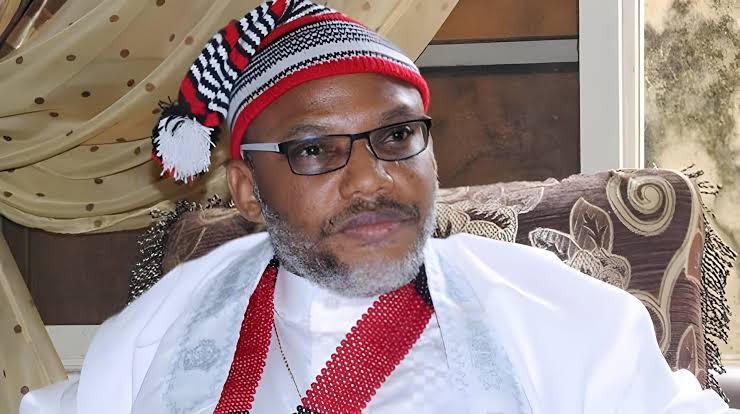
Controversy Deepens as Justice James Omotosho Declares Nnamdi Kanu ‘Fit for Trial’ Despite Court and UN Rulings
Rights groups and legal experts question the integrity of the report presented by the Nigerian Medical Association, accusing authorities of manipulating due process to prolong the Biafran leader’s illegal detention.
Abuja, Nigeria – October 16, 2025
The long-running trial between the Nigerian government and the abducted British citizen and leader of the Indigenous People of Biafra (IPOB), Mazi Nnamdi Kanu, has taken another contentious turn.
The Nigerian Medical Association (NMA) has informed the Federal High Court in Abuja that Kanu’s health is “not life-threatening” and that he is “fit to continue with trial,” a proceeding that courts have already ruled to be unlawful.
The NMA’s statement, delivered before Justice James Omotosho, followed the association’s purported medical evaluation of Kanu in custody. While acknowledging that he suffers from health complications, the panel insisted these do not impair his ability to stand trial.
Critics, however, view the report as part of a pattern of manipulation aimed at justifying the government’s continued defiance of judicial and international directives.
Kanu was abducted from Kenya in June 2021 in what has been widely condemned as an act of extraordinary rendition by the Nigerian government. He has since accused that he was severely tortured for eight days in Kenya before being forcibly transferred to Nigeria, leading to some of his current medical crisis.
In October 2022, the Abuja Court of Appeal discharged and acquitted Kanu, declaring his rendition illegal and ruling that no court in Nigeria could legitimately try him under such circumstances. The government, however, rejected the verdict and continued to detain him, drawing widespread condemnation.
The United Nations Working Group on Arbitrary Detention also weighed in that same year, describing Kanu’s abduction, torture, and prolonged solitary confinement as violations of both Nigerian and international law. The UN body called for his “immediate and unconditional release,” an order the Nigerian government has so far ignored.
Kanu’s ordeal dates back to 2015 when he was first arrested in Lagos and detained under harsh conditions despite repeated court orders for his release. In 2017, soldiers invaded his family home in Afaraukwu, Abia State, in what is described as a “gestapo-style” operation. Though Kanu narrowly escaped, at least 27 unarmed civilians were reportedly killed, including women and family dog.
For nearly two years afterward, his whereabouts remained unknown, sparking speculation that he had been killed. He eventually resurfaced in Israel in 2019 before relocating to Britain.
Reacting to the latest development, Kanu’s lawyer, Barrister Aloy Ejimakor, criticized the NMA’s presentation as “an ambush” and deeply questionable intervention. Ejimakor said the supposed medical evaluation ordered by the court on September 26 was never carried out. Instead, he revealed, that the NMA’s report was based on an informal meeting organized by the Department of State Services (DSS) eight days earlier, on September 18, however it was fraudulently dated “the 13th of October.”
“That was quite a surprising ruling today, we were served all of a sudden, as a matter of surprise, an ambush,” Ejimakor told reporters. “The court had ordered that Mazi Nnamdi Kanu be examined by the Nigerian Medical Association, that examination was never carried out, and the order was entered on the 26th September, and re-stated on 8th October. That part of the order was disobeyed. They never examined him. So, the report is based on some informal meeting.”
The DSS, Nigeria’s secret police, has long been accused by human rights organizations of ignoring court orders and torturing detainees.
Analysts say the court’s acceptance of the NMA’s findings continues to establish as a norm what many describe as a “judicial travesty,” with a far-reaching consequences not only for Kanu and IPOB but for Nigeria’s unity.
Public reaction on social media has been swift, with many Nigerians calling the development “another act of judicial bias” and expressing long known distrust in the independence of the judiciary.
While IPOB’s leadership has yet to issue an official statement, human rights advocates argue that the case represents a litmus test for Nigeria’s justice system, and for its willingness to respect the rule of law in politically sensitive cases.
Controversy Trails Justice Omotosho’s Verdict on Nnamdi Kanu as Mrs. Okwu-Kanu Raises Alarm
Judicial Decay Laid Bare: IPOB Condemns “Circus of Injustice”
Breaking News: Abuja Court Rejects Request to Move Nnamdi Kanu to National Hospital Abuja